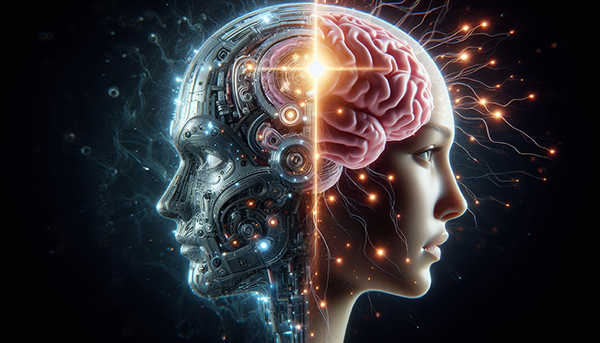Powerful Mind Part 40
Welcome to this week’s Bill Harvey Blog, December 12, 2025.
Created December 15, 2023
Read Powerful Mind 39 | See all 12 Powerful Mind Keys

Simplify the task of conducting your inner orchestra, without oversimplifying it.
The reason homo sapiens have settled into this pandemic coping pattern I call Emergency Oversimplification Procedure (EOP) is that the mind – with its jumble of thoughts, feelings, images, memories, imaginings all coming too fast one atop the other, is initially very difficult to orchestrate. That might not have been the case before written language, when the number of question-producing experiences we had each day was likely to have been a mere handful. Since the advent of written language, there has been an explosion of inventions (including tools, weapons, and media), bringing us more and more information per day. As you know, I call this Acceleritis, the probable cause of EOP, which, 50 years later, neuroscience is now discovering as the default network.
The purpose of Key #10 is to simplify the task of conducting this inner orchestra, without oversimplifying it as in the case of EOP.
Let’s review the ground we’ve covered so far regarding Key #10:
-
- Interpret your feelings constructively – seek to learn from bad feelings – transform all inner experiences into future operating guidelines
- Be grateful for existing – use willpower to maintain a permanent attitude of positivity – filter out negative hypnotic suggestions
- Edit your headstream – test your inner drafts – update your senators (your inner AI ego robot) (Keys #1 & #2)
- Balance your own arousal so that it is optimal for performance – detached from addiction to specific outcomes
- Go with the Flow as long as it remains 100% positive – gently and Socratically share any concerns with others only if that feels more helpful than a wait-and-see attitude
- Note your own mental chatter without taking it as how you really feel (Key #7)
- Do not have a closed mind with regard to the possibility that you and the universe are one connected consciousness
- Minimize time spent worrying by detecting worry and immediately turning it into fixing
This may seem like too many things to consider at once, all the time. You are absolutely right. That’s why we went into EOP in the first place. So don’t try to explicitly juggle all these balls, just let them sink into the core of your being. How then to simplify one’s inner life so as to stay in Observer and Flow states as much as possible?
Optimizing Rituals
We all have our rituals, things we do each day. Our life is organized around these daily patterns. These little certainties impart a sense of order and keep our life from flying apart in troubling times.
In order to remove the feeling that the 12 Keys, each of them filled with complexity, is too much to internalize workably, here are some suggested additions to your daily ritual, which can pragmatically overcome this sense of being daunted by the size of the task of self-mastery.
Check for Joy
The first thing in the morning, before getting out of bed, or even opening your eyes, remember your life’s mission and check for your own joy. You ideally will be eager to jump out of bed and seize the day, but if you’re not, contemplate what is bothering you.
I’ve noticed that sometimes I’m out of sorts for a day or more right before my subconscious mind delivers an idea that changes everything. It’s almost like birthing pains. The idea itself that finally emerges fills me with joy again. Often it’s something that’s been right in front of my face, sometimes for months or years, and seems utterly obvious in retrospect.
If joy is absent at the start of your day, see if you can get an angle on the possible cause even before you get out of bed. Maybe your dreams will offer clues. Obligations may cause you to need to keep moving, but you can continue to dissect why your passion mission is not enough to motivate your joy today, while bathing and/or showering and otherwise getting ready for the day. This is usually a very productive time for diagnosing your own mood.
Be on the lookout for the root of your lack of joy being some attachment you have allowed to persist. You might be attached to doing things in an orderly way, and the pressure of incoming assignments and requests may have destroyed any hope of order. All you can do is to focus on prioritizing and being decisive until order is re-established. Scheduling when you are going to get something done, and being extremely conservative about how long each task will take, can get you back into feeling that you can be patient, systematic, and thorough.
Some or many of these tasks might be questions in your own mind and feelings about what to do about specific situations, or about abstract principles. It relieves stress to keep a list of these unanswered questions so you can come back to them without being attached to getting them all resolved asap. It doesn’t matter how long it takes. It helps to have the sense that you have added one new thought or idea about each such question every time you contemplate it.
Passion Projects
Be aware of your own passion projects and how each one figures into your overall mission. Keep a list of those and see how you change their ranking over time.
Each person you love is one of those passion projects. Each goal in your life is on that list.
In the day-to-day tumble of obligatory and voluntary events, having the mission and passion projects to remind you of the meaning of your life is restorative.
Glance at the list once a day. This is effectively a form of Key #8, rotating your attention to cover every passion project. This will have the effect of springing out good new ideas or reminders that should have higher priority for sooner action on one or more of your passion projects.
Daily Alone Space
While keeping up with the tsunami of responsibilities, duties, chores, assignments, and unexpected events, days tend to pass without allowing any space for strategic thinking. This is why it’s mission-critical that you give yourself an uninterruptable 20 minutes or more each day to meditate and contemplate how your life is going. You can do this while doing yoga, exercising, or while sitting up straight, cross-legged, or in a chair. Slow deep breathing helps. Often, the best time each day for this is around 5 pm, but it can be any time you can carve out that particular day.
Simply watch the material your mind brings up and decide what is important enough to think about. You may find that you are displeased with something that you yourself did. If so, forgive yourself by understanding why the event happened as it did, and make a plan as to handle it if a similar situation presents itself in the future – as it undoubtedly will.
Remind yourself to be grateful that you screwed up in this relatively minor way this time, because that provoked your learning from it and deciding upon how to handle such things in the future, when they might be far more important to your life and mission. Just in case the universe is conscious and actually let this small goof happen so you could be armed to not make the same mistake in a situation of much greater importance, thank the universe or God, whichever way you prefer to address the Totality Of Existence.
Last Thoughts Before Sleep
Before you let yourself fall asleep, prevision the next day the way you’d like to see it come out. Obviously, a glance at your schedule before getting into bed will make this much easier and more effective.
As you do this, you may find yourself rehearsing what you will say and will catch things that you realize would be stepping on a land mine. Rephrase those, of course. You will then find yourself feeling more confident about the morrow, and this will take you into a fine sleep.
You may also see how certain meetings or events could take a bad turn. Rehearse your optimal, gentle, Socratic, constructive, win/win response to such pushbacks. But do not dwell upon those downside possibilities once you have prepared yourself for them. Before you go to sleep once again, prevision the day the way you would prefer it to go, strengthen your intentions and your resoluteness with courage, and enjoy a beautiful night’s sleep.
Those are the daily rituals we suggest upon rising, after work, and before going to sleep.
Learn & Teach
As you progress through life, look at the whole process as one of learning, and share your learnings when people ask for that. You may also sometimes cautiously try sharing what seems to you to be a piece of learning that the other person needs, even though they have not asked for help. But be prepared to immediately abandon the idea if the other person doesn’t want to hear it.
Mindquiet
There may be times when, despite how much you have learned and how much time you spend in Observer state, everything is just coming at you too fast, from the outside as well as the inside. It’s best at those times, if you can, to excuse yourself and go into a bathroom stall where you can be alone, and exercise your will to blank out the flow of inner thoughts and feelings. Just breathe slowly and deeply, and wait and watch the blankness of your inner world. Big Picture integrations, summarizations of where you are at, may soon present themselves to your psyche. Often, it will resolve into a single main challenge you face. This clarity and focus will equip you to flow with the situation courageously and effectively.
Key # 10:
Patiently determine the most constructive use of each salient inner experience
What this Key says is that whatever is going on inside of us, some of it is obviously more important, let’s call that the salient part. Don’t bother with minor imperfections, but go for the Big Picture items that cry out to be dealt with first. Look patiently at those salient items without allowing the feeling of urgency to take you over. Treat that feeling of urgency as part of the auto-completing bio-AI in your brain, not as you yourself.
Contemplate each salient item as something to learn from, and the impetus for you to give yourself new guidelines. Don’t be attached to reaching closure on the new solution, let its picture resolve in its own time. Maintain a list of items that are still cooking and use strikethroughs when they have resolved themselves so that you can look back at your trail up the mountain.
My best to all,
![]()





